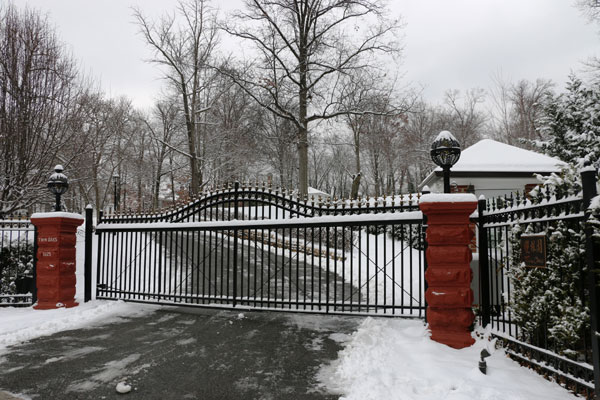US 'disappointed' at Taiwan's flag-raising
Updated: 2015-01-07 09:28
By CHEN WEIHUA in Washington(China Daily USA)
|
|||||||||||
 |
|
Twin Oaks Estate in Washington seen on snowy Tuesday. A ceremony of raising Taiwan flag here on January 1 drew protest from the Chinese government and disappointment expressed by the US government. Chen Weihua/China Daily |
The United States expressed disappointment Tuesday over a Jan 1 ceremonial raising of Taiwan's flag in the Twin Oaks Estate in Washington.
State Department spokeswoman Jen Psaki said at a daily briefing on Tuesday: "We're disappointed with the action.The flag-raising ceremony violated our longstanding understanding on the conduct of our unofficial relations."
Psaki emphasized that the US has a robust set of cultural relations with Taiwan, but does not have diplomatic relations.
Taiwan's Central News Agency reported Jan 2 that the flag-raising ceremony was held Jan 1 at Twin Oaks for the first time in the last 36 years since the US established diplomatic ties with the People's Republic of China.
The story quoted Shen Lyushun, Taiwan's representative to the US, as saying that it was meaningful to be able to hold a flag-raising ceremony again at Twin Oaks, an 18-acre estate in Washington's Cleveland Park neighborhood.
The Chinese government has protested against the ceremony being held in Washington.
"We are resolutely opposed to the so-called flag-raising ceremony staged by Taiwan's office in the US and have lodged solemn representations with the American side," Chinese Foreign Ministry spokeswoman Hua Chunying said at a daily briefing in Beijing on Monday.
"The Chinese side requests the American side to adhere to the one-China policy and the principles established by the three China-US joint communiqués, act with discretion when dealing with Taiwan-related issues and avoid the recurrence of a similar incident," she said.
Psaki said Tuesday that US officials in Washington and Taipei are talking to Taiwan authorities about the issue.
She reiterated that it was inconsistent with US policy, and the US side was unaware of the event in advance. She emphasized that the Twin Oaks is the compound of Taipei's representative and not a private person's home.
"The ceremony is not consistent with US policy," she said. "We remain fully committed to the US one-China policy," she said, adding that no US government personnel attended the event in any capacity.
The ceremony on Jan 1 was attended by several officials from the Taipei Economic and Cultural Representative Office in the US and military officers posted in the US and others, according to Taiwan's Central News Agency. A Reuters report said that more than 100 people attended the ceremony.
Just blocks west from the National Zoo, Twin Oaks was the official residence of "Republic of China" ambassadors to the US between 1937 and 1978, before the US severed diplomatic ties with Taiwan authorities.
Several US experts on Taiwan reached by China Daily on Tuesday either commented on the issue off the record or said they were unaware of the background regarding the flag-raising event.
Taiwan has long remained a sensitive issue in China-US relations. But improved cross-Straits relations since 2008 have dramatically reduced tensions. Hundreds of flights daily now linkTaiwan with the Chinese mainland since direct flight resumed in 2008. Bilateral trade reached $197.3 billion in 2013, up 16.7 percent over the previous year.
The strong performance of the Democratic Progressive Party (DPP) in the local elections in Taiwan last month has raised uncertainty about the relations.
US President Barack Obama drew a sharp protest from the Chinese government last month when he signed the Naval Vessel Transfer Act to pave the way for the US government to sell four used Perry-class guided missile frigates to Taiwan.
Chinese Foreign Ministry spokesman Qin Gang described the US action of arms sales to Taiwan as "brutally interfering in China's domestic affairs and undermining China's sovereignty and security interests".
"It goes against the trend of peaceful development of the cross-Straits relations," Qin said.
ZhaDaojiong, professor at the School of International Studies of Peking University, said that the announcement of the arms sales caused many to wonder if the Obama administration was backpedaling in pursuing ties with China.
chenweihua@chinadailyusa.com
Related Stories
China urges US to be cautious on Taiwan-related issues 2015-01-05 20:24
Former Taiwan leader Chen given medical parole 2015-01-05 14:17
Today's Top News
Export quota system for rare earths abolished
Euro slumps amid concern over Greek exit after election
New York City community rallies around Liu family
Stock link bid for HK, Shenzhen
The 2015 Palace Museum datebook goes viral
China braces for slower but better growth in 2015
8 missing after cargo ship capsizes off Scotland
PLA announces a major reshuffling
Hot Topics
Lunar probe , China growth forecasts, Emission rules get tougher, China seen through 'colored lens', International board,
Editor's Picks

|

|

|

|

|

|





